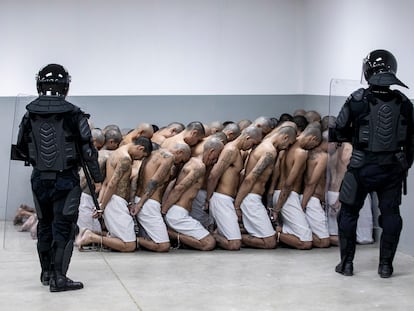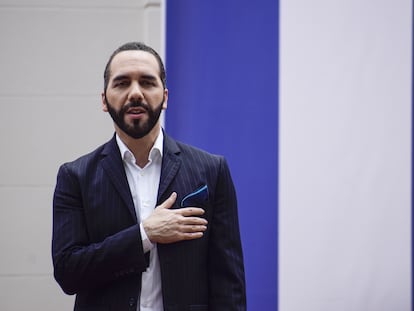Mothers by force: The silent impact of President Bukele’s ‘state of exception’ in El Salvador
The mass arrests ordered by the president have forced women to take on heavier burdens. They have been looking after imprisoned relatives, while acting as caregivers for children and the elderly
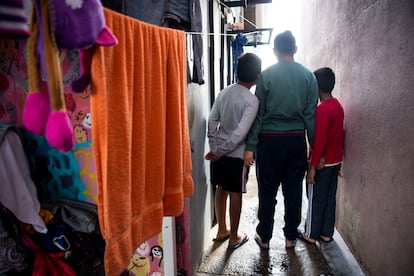
After raising her two children for more than two decades, Vilma Mancía – a 65-year-old Salvadoran woman – didn’t think that she would become a mother again. But on the afternoon of April 4, 2022, six children were born to her at once.
That afternoon, Mancía – a thin woman with brown skin – was selling vegetables out of her small stall in the market. She works in the municipality of San Martín, in the metropolitan area of San Salvador – the capital of El Salvador. Suddenly, another vendor came running to tell her that, a few blocks from the market, the police had just detained Vilma’s daughter. And, just a few minutes later, a call alerted her that her son had also been captured, while he was eating lunch at his house.
At that moment – and for a long time afterwards – Mancía couldn’t think of anything other than how to get her children out of prison. From that day onwards, she was also in charge of her six grandchildren: five boys and one girl, between the ages of eight months and six years. Long after their parents were arrested, Mancía continues to care for them as if she were their mother.
“I feed them, bathe them, change them, take them to school, give them my care and my love. As if they were my children,” Mancía says, nearly 15 months after the afternoon that changed her life.
Back in April of 2022, the state of emergency – known as the “state of exception” – had only been in force for a few days. This repressive measure – imposed by the administration of President Nayib Bukele – was initiated as part of the so-called “war against gangs.” It has allowed the police and army to carry out massive raids, arresting almost anyone who stood in front of them. More than a year later, these raids have resulted in the capture of more than 68,000 people. Thousands of innocents have been detained in the process, according to two reports from human rights organizations. And, to date, around 5,000 prisoners – who were detained under the emergency laws – have been found innocent and released.
The regime established by the Bukele administration has achieved the dismantling of El Salvador’s gangs. However, at the same time, several serious human rights violations have been committed, ranging from arbitrary detention, to death from torture and suffocation inside Salvadoran prisons. While most of the detainees are men, women have also suffered consequences that affect them in a more painful, silent way.

A report by Cristosal – a Salvadoran NGO set up to defend human rights – was published last Monday. It points out the fact that the emergency measures have resulted in particular forms of state violence against women, forcing them to watch over imprisoned relatives and assume the role of caregiver to girls, boys, adolescents, or older adults. Some even have to care for those who live in other people’s homes, such as in the case of Vilma Mancía.
Being a mother by force is not a new form of slavery in El Salvador. In 2018, Factum Magazine revealed how the Barrio 18 gang forced women from a community in the capital to become the adoptive mothers of children of gang members who were imprisoned. This dynamic is now being repeated… but by the state.
There’s no official figure for how many women have been detained during the state of exception. In fact, there is no official figure for the number of detainees. The only thing known is that there are more than 68,000… and this is only because the number has been mentioned in sporadic statements made by government officials in television interviews, or in tweets that the police or the president have posted. All detailed information in this regard has officially been declared secret. However, a report published in August of 2022 by Human Right Watch stated that 15.8% of the people detained during the state of exception by that point in time were women.
The National Civil Police of El Salvador have published images of women on social media, indicating that they are gang members. Some of the photos even show their tattoos, alluding to gang affiliation. However, in El Salvador, for nearly two decades, the role of women in the gangs has been marginal. At least since 2005, the structures of the Mara Salvatrucha 13 (MS-13) and Barrio 18 gangs prohibited women from continuing to be active members or “homegirls” – something that was previously permitted. Since then, their role has been limited to being girlfriends or collaborators of gangsters. Their criminal activities have been limited to storing weapons, drugs and money obtained from extortion, or picking up packages.
However, Cristosal’s latest report reveals new information: of the more than 5,000 complaints related to possible human rights violations made by members of the public during the 15-month-long state of emergency, about 80% have been filed by women. According to the organization, this means that it is primarily women who have taken charge of detainees’ cases, while also bringing food and clothing to their imprisoned loved ones. Outside the prisons, it has become normal to see hundreds of women lining up, bringing hygienic products and food packages to their relatives. This has even led to the establishment of small informal markets around the penitentiaries. Care packages can cost between $35 and $170… a price paid by the women who have assumed the role of caring for detainees.
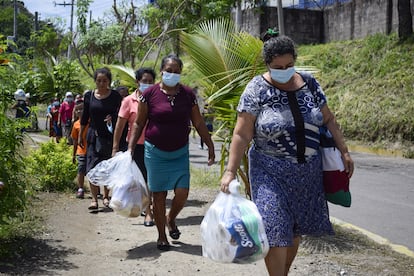
Since the day her two children were captured nearly 15 months ago, Vilma Mancía hasn’t only had the burden of feeding six more mouths. She has also had to take charge of the judicial processes that her two children are facing. Her son is in Mariona prison, while her daughter is in Apanteos. She has managed to learn very little about their cases. All her spare time outside of her vegetable store is spent bringing them food or caring for her six grandchildren, leaving her with little strength or cash.
Two months ago, Mancía had a sudden pain in her stomach. At first, she thought she had food poisoning. She also considered the possibility that the pain was from stress. But when she went to the doctor, she was diagnosed with stomach cancer.
“I would like someone to help me… at least with all these children. I can’t manage all of them anymore. They’ve told me to hand them over to the government, but I don’t want to,” Mancía says.
Miscarriages, both in and out of prison
Cristosal has also documented cases of girls and female adolescents who have been victims of sexual harassment and abuse by police officers and soldiers, who take advantage of the almost absolute power that the emergency measures grant them. “In some cases, this situation has forced families to move, or send the girls and adolescents to other places, so that they can avoid being abused or detained for not giving in to the harassment of law enforcement officers,” the report notes.
Many women who were pregnant at the time of their detention have been forced to give birth inside the prisons, without their relatives being able to find out about the state of health of the mother or the child. Some who gave birth just before being detained were eventually separated from their children.
Cristosal has recorded testimony by women who lived under inhumane conditions in the detention facilities. “In some [areas] that were in the lower part [of the prison], there were thousands of women sleeping on the floors, without mattresses, without blankets. Since we were in the winter season, they got wet at night. Since there was no medical assistance, I saw a woman die, an old woman, maybe 50 or 56-years-old,” says one of the women interviewed.
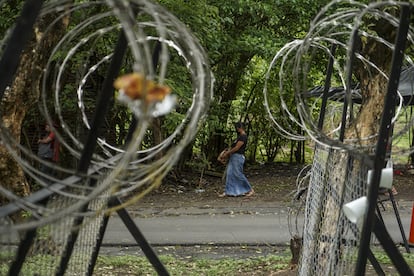
The report also indicates that some women witnessed miscarriages inside the prisons, caused by mistreatment from the authorities. “There was a woman who had to [head out to the clinic] every day to heal and, when she had surgery, they didn’t realize she was four months pregnant. After the operation, the girl got worse again – they took her to the hospital and they did a curettage,” the document states.
Beyond the walls of the prisons, the state of exception has also impacted the lives of women who were going to be mothers. The report mentions the case of a 24-year-old fisherman, who died as a result of torture in prison under emergency rule. “The shock of his death caused his wife – who was five-months pregnant – to lose their child,” it reads.
But the effects of the emergency regime don’t stop there. There are also babies dying from being incarcerated. This past Friday, a local newspaper published a story about a six-month-old baby named Genesis, who died after spending that same amount of time in prison with her mother. Until the publication of the story, the mother didn’t even know about the death of her baby. Despite having a release order issued by a judge, she remains in prison.
Sign up for our weekly newsletter to get more English-language news coverage from EL PAÍS USA Edition
